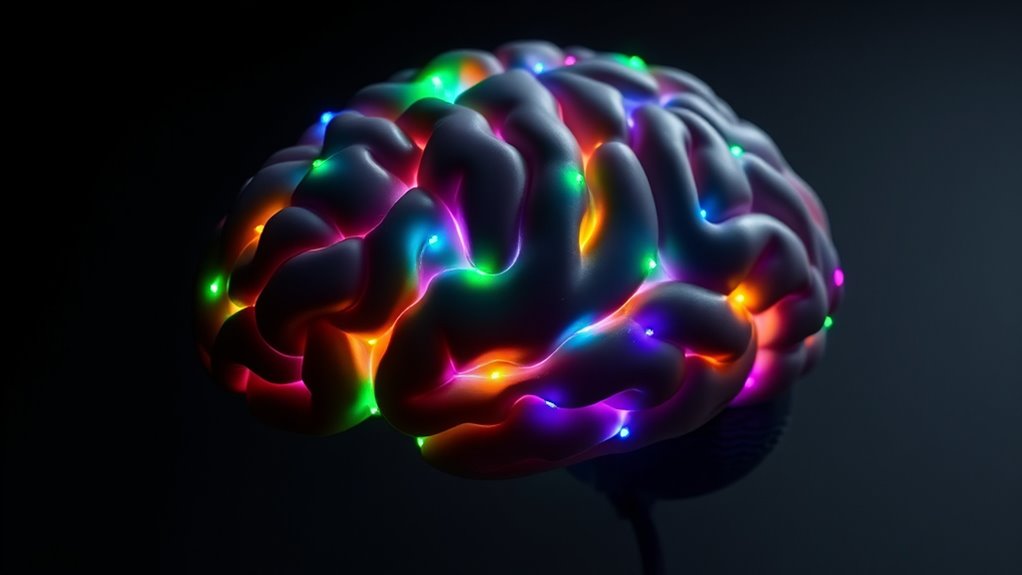Self-compassion rewires your brain by strengthening pathways linked to positive emotions and resilience while reducing stress responses. When you practice kindness toward yourself, neuroplasticity allows your brain to adapt, activating areas like the prefrontal cortex and calming the amygdala. This shift promotes emotional balance and reduces self-criticism over time. Keep exploring how this process works and you’ll discover ways to reshape your emotional health more deeply.
Key Takeaways
- Self-compassion rewires the brain, strengthening pathways linked to positive emotions and resilience through neuroplasticity.
- It activates brain regions like the insula and anterior cingulate cortex, promoting calmness and well-being.
- Practicing kindness toward oneself reduces stress responses by calming the amygdala and enhancing prefrontal cortex regulation.
- Repeating self-compassion practices builds long-term neural changes that improve emotional resilience and balance.
- Overall, self-compassion fosters a safer, more responsive emotional system, decreasing self-criticism and promoting mental health.

Have you ever wondered how practicing self-compassion influences your brain? When you treat yourself with kindness during tough times, you’re actually shaping your brain in powerful ways. This process taps into brain plasticity—the brain’s incredible ability to change and adapt throughout your life. By regularly practicing self-compassion, you’re encouraging neural pathways associated with positive emotions, resilience, and emotional regulation to strengthen. Conversely, negative self-talk or harsh self-criticism can reinforce pathways linked to stress, anxiety, and emotional instability. So, when you choose to be gentle with yourself, you’re actively rewiring your brain toward healthier responses. This neuroplasticity means that the more you practice self-compassion, the easier it becomes to manage difficult emotions and stay balanced during challenging moments. Additionally, engaging in compassionate practices can influence the activation of specific brain regions involved in emotional processing. Your brain’s capacity for emotional regulation is fundamental here. Self-compassion helps you develop a kind, understanding inner voice that can soothe distress rather than escalate it. When you encounter setbacks or mistakes, instead of spiraling into self-criticism, you can respond with warmth and understanding. This shift in your emotional response system involves specific brain regions, like the prefrontal cortex, which is responsible for rational thinking and regulation of emotions, and the amygdala, which processes fear and stress. By cultivating self-compassion, you’re strengthening your prefrontal cortex’s influence over the amygdala, reducing the intensity of negative reactions. Over time, this creates a more resilient emotional regulation system, allowing you to navigate life’s ups and downs with greater ease.
Practicing self-compassion isn’t just about feeling better in the moment; it has tangible effects on your brain’s structure and function. Studies show that compassionate practices can lead to increased activity in brain areas linked to positive emotions, like the insula and anterior cingulate cortex. These changes promote a sense of calm and well-being, making it easier to recover from emotional setbacks. Additionally, consistent self-compassion builds a sense of safety within your brain, which minimizes the fight-or-flight response often triggered by stress. As a result, you become less reactive and more responsive, creating a healthier balance in your emotional life. In particular, understanding the concept of brain plasticity highlights how adaptable and dynamic your brain truly is, reinforcing the importance of cultivating self-compassion as a lifelong practice. In essence, every act of self-kindness you practice rewires your brain for better emotional regulation and resilience. Your brain’s plasticity means that these changes aren’t fixed—they grow stronger with repetition. The more you nurture a compassionate attitude toward yourself, the more you reinforce neural pathways that support emotional stability and well-being. This ongoing process empowers you to face life’s challenges with a calmer, more centered mind, demonstrating just how deeply self-compassion can influence your brain’s architecture for the better.
Frequently Asked Questions
How Quickly Can Self-Compassion Change Brain Activity?
Self-compassion can change your brain activity surprisingly quickly, thanks to neural plasticity. When you practice self-compassion regularly, your brain rewires itself, strengthening pathways linked to emotional resilience. Although the exact timeline varies, some studies suggest noticeable shifts can occur in just a few weeks. By cultivating kindness toward yourself, you enhance emotional resilience and promote healthier brain function over time, making positive change both achievable and sustainable.
Are Some People Naturally More Self-Compassionate Than Others?
You might think some people are naturally more self-compassionate, but personality traits and self-awareness play big roles. While genetics influence tendencies, you can develop self-compassion through practice. Your awareness of your emotions and thoughts helps you choose kindness over judgment. So, even if you’re less naturally self-compassionate, you can cultivate it over time by increasing self-awareness and understanding your personality traits, making compassion a skill you can learn.
Can Self-Compassion Improve Mental Health Long-Term?
Yes, self-compassion can improve your long-term mental health. By practicing compassion meditation, you strengthen your ability to be kind to yourself, which boosts self-esteem building. Over time, this process reduces stress, anxiety, and depression. Consistently nurturing self-compassion rewires your brain, making these positive effects more lasting. So, investing in daily compassion practices truly benefits your mental well-being in the long run.
Does Self-Compassion Affect Physical Health?
Did you know that practicing self-compassion can boost your physical health? When you’re kind to yourself, you strengthen the mind-body connection, which helps reduce stress levels. Lower stress means fewer health problems over time, like heart issues or weakened immunity. By embracing self-compassion, you actively promote stress reduction and support your overall well-being, showing that mental kindness truly benefits your physical health in the long run.
How Does Self-Compassion Influence Emotional Regulation?
Self-compassion boosts your emotional regulation by enhancing emotional resilience and reducing stress. When you’re kind to yourself, you lower feelings of anxiety and frustration, making it easier to manage difficult emotions. This practice rewires your brain to respond more calmly to setbacks, helping you stay balanced. As a result, you develop greater emotional resilience, allowing you to bounce back faster from stress and stay centered during challenging times.
Conclusion
So, next time you’re feeling down, remember your brain is secretly cheering you on with a built-in kindness superpower. By practicing self-compassion, you’re basically rewiring your brain to become a superhero of kindness, capable of transforming even your worst days into moments of growth and resilience. It’s like giving your mind a giant hug that’s so powerful, it could probably make even the gloomiest clouds dance with joy. You’ve got this—your brain’s got your back!










